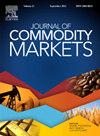Oil price volatility and corporate debt choice: Evidence from China
IF 4.5
4区 经济学
Q1 BUSINESS, FINANCE
引用次数: 0
Abstract
Crude oil is considered a vital energy source that significantly shapes firms' production, operation, investment and financing activities. This paper examines the association between oil price volatility (OPV) and corporate debt choice. Using a sample of Chinese listed firms from 2008 to 2022, we find that OPV can increase (decrease) reliance on bank debt (bond financing). This finding is consistent after conducting various robustness checks. Besides, this effect is greater for energy-related industries, less competitive industries, or non-stated-owned firms. Moreover, we find that this effect stems from increased information asymmetry and escalated financial distress risks. Finally, OPV arising from positive price fluctuations has a greater impact on debt choice than negative price changes. This study enhances the understanding of OPV's economic implications, emphasizing the need for policymakers to consider the macroeconomic context when evaluating firms' debt strategies.
油价波动与企业债务选择:来自中国的证据
原油被认为是一种重要的能源,对企业的生产、经营、投资和融资活动有着重要的影响。本文考察了石油价格波动与企业债务选择之间的关系。以2008 - 2022年的中国上市公司为样本,我们发现OPV会增加(减少)对银行债务(债券融资)的依赖。在进行各种稳健性检查后,这一发现是一致的。此外,对能源相关行业、竞争力较弱行业和非国有企业的影响更大。此外,我们发现这种效应源于信息不对称的增加和财务困境风险的升级。最后,价格正波动产生的OPV比价格负变化对债务选择的影响更大。本研究加强了对OPV经济影响的理解,强调决策者在评估企业债务战略时需要考虑宏观经济背景。
本文章由计算机程序翻译,如有差异,请以英文原文为准。
求助全文
约1分钟内获得全文
求助全文
来源期刊

Journal of Commodity Markets
Multiple-
CiteScore
5.70
自引率
2.40%
发文量
53
期刊介绍:
The purpose of the journal is also to stimulate international dialog among academics, industry participants, traders, investors, and policymakers with mutual interests in commodity markets. The mandate for the journal is to present ongoing work within commodity economics and finance. Topics can be related to financialization of commodity markets; pricing, hedging, and risk analysis of commodity derivatives; risk premia in commodity markets; real option analysis for commodity project investment and production; portfolio allocation including commodities; forecasting in commodity markets; corporate finance for commodity-exposed corporations; econometric/statistical analysis of commodity markets; organization of commodity markets; regulation of commodity markets; local and global commodity trading; and commodity supply chains. Commodity markets in this context are energy markets (including renewables), metal markets, mineral markets, agricultural markets, livestock and fish markets, markets for weather derivatives, emission markets, shipping markets, water, and related markets. This interdisciplinary and trans-disciplinary journal will cover all commodity markets and is thus relevant for a broad audience. Commodity markets are not only of academic interest but also highly relevant for many practitioners, including asset managers, industrial managers, investment bankers, risk managers, and also policymakers in governments, central banks, and supranational institutions.
 求助内容:
求助内容: 应助结果提醒方式:
应助结果提醒方式:


